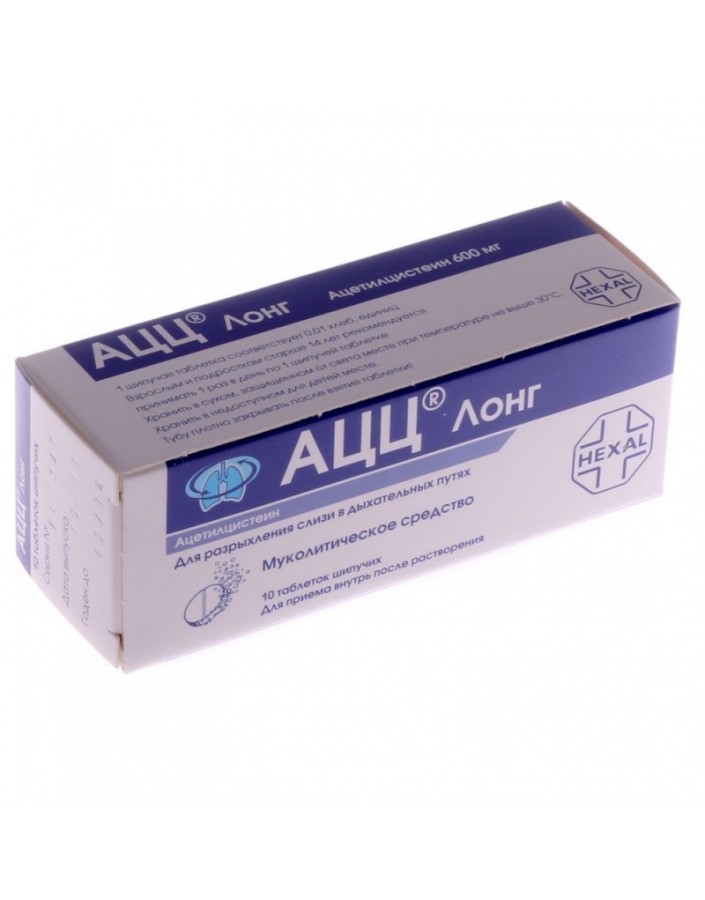




Security policy (edit with Customer reassurance module)

Delivery policy (edit with Customer reassurance module)

Return policy (edit with Customer reassurance module)
ACC granules for the preparation of oral solution:
1 sachet (3 g) contains acetylcysteine 100, 200 or 600 mg;
6, 10 or 20 pcs. packaged.
ACC pilling tablet:
1 pill contains acetylcysteine 100, 200 or 600 mg;
10, 20, 50 or 100 pcs. packaged.
ACC - mucolytic drug. The presence of sulfhydryl groups in the structure of the acetylcysteine molecule contributes to the breakdown of disulfide bonds of acid mucopolysaccharides of sputum, which leads to a decrease in the viscosity of mucus. The drug retains activity in the presence of purulent sputum.
With prophylactic use of acetylcysteine, a decrease in the frequency and severity of exacerbations in patients with chronic bronchitis and cystic fibrosis has been observed.
Diseases of the respiratory system, accompanied by increased formation of viscous difficult to separate mucus: acute and chronic bronchitis, obstructive bronchitis; pneumonia; bronchiectasis; bronchial asthma; bronchiolitis; cystic fibrosis; laryngitis; acute and chronic sinusitis; otitis media
Peptic ulcer and duodenal ulcer in the acute phase; hemoptysis; pulmonary hemorrhage; pregnancy; lactation period (breastfeeding); children's age up to 6 years (drug in the form of granules); children's age up to 14 years (with the content of acetylcysteine 600 mg); Hypersensitivity to acetylcysteine and other components of the drug.
Carefully use in patients with varicose veins of the esophagus, with an increased risk of developing pulmonary hemorrhage and hemoptysis, with bronchial asthma, diseases of the adrenal glands, liver and / or kidney failure.
For bronchitis, bronchiectasis, bronchiolitis, laryngitis, bronchial asthma, sinusitis, otitis media adults and adolescents over the age of 14 are advised to prescribe the drug at 200 mg 3 times / day or 600 mg ACC LONG 1 time / day.
Children aged 6 to 14 years old - 200 mg 2 times / day (400 mg / day).
Children aged 2 to 5 years old - 100 mg 2-3 times / day (200-300 mg / day) in the form of effervescent tablets.
For children under 1 year old, the drug can be prescribed only for health reasons in a hospital under the supervision of a physician.
With cystic fibrosis children over 6 years old are recommended to take 200 mg 3 times / day (600 mg / day). Children aged 2 to 6 years old - 100 mg 4 times / day (400 mg / day). Babies, starting from the 10th day of life, and children under the age of 2 years are recommended to prescribe 50 mg (1/2 sachet containing 100 mg of acetylcysteine) 3 times / day. The dose should be increased gradually.
For patients with a body weight of more than 30 kg with cystic fibrosis, the drug can be taken in a dose of up to 800 mg / day.
In case of sudden short-term catarrhal diseases, the duration of treatment is 5-7 days. In case of long-term diseases, the duration of therapy is determined individually. In chronic bronchitis and cystic fibrosis, the drug should be used for a long time to prevent infections.
Additional fluid intake enhances the mucolytic effect of the drug.
Granules for the preparation of oral solution (with the smell of orange) should be dissolved in water, juice or cold tea and taken after meals.
The granules for the preparation of a hot drink (1 bag) are dissolved with stirring in 1 cup of hot water and are drunk as hot as possible. If necessary, you can leave the prepared solution for 3 hours.
Effervescent pills should be dissolved in 1/2 glass of water and taken immediately after dissolution, in exceptional cases, you can leave the finished solution for 2 hours.
From the digestive system: rarely stomatitis; in some cases, diarrhea, vomiting, heartburn and nausea.
Cardiovascular: in some cases - the fall of blood pressure, tachycardia.
Respiratory: in isolated cases - the development of pulmonary hemorrhage as a manifestation of hypersensitivity reactions.
Allergic reactions: in isolated cases - bronchospasm (mainly in patients with hyperreactive bronchial system in bronchial asthma), skin rash, itching and urticaria.
Other: rarely headaches, tinnitus.
In bronchial asthma and obstructive bronchitis, acetylcysteine should be administered with caution under the systematic control of bronchial patency.
With the development of side effects should stop taking the drug.
When dissolving the drug, it is necessary to use glassware, avoid contact with metals, rubber, oxygen, easily oxidized substances.
The contents of 1 sachet of granules with the content of acetylcysteine 200 mg corresponds to 0.21 XE, 600 mg - 0.17 XE.
The contents of 1 sachet of granules (with an orange smell) 100 mg corresponds to 0.24 XE, 200 mg - 0.23 XE.
1 pill effervescent AC 100 and AC 200 corresponds to 0.006 XE.
Store in a dark place at a temperature not exceeding 25 ° C.
Acz-long